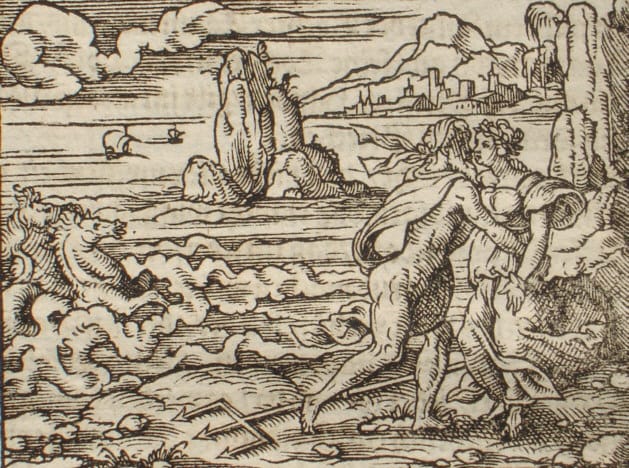Transgender Men in Ancient Roman Literature

Back when I was reading Virgil's The Aeneid—an epic that invigorated me and showed me that there is such a thing as incredible polytheist writing—a throwaway line caught my eye. It occurred in the most compelling of The Aeneid's books, "The World Below," which describes the Underworld as Aeneas visits. Among the famous Dead who linger there, as translated by Robert Fitzgerald:
...and Caeneus,
A young man once, a woman now, and turned
Again by fate into the older form.
Of course, I went, "Hey ho, what? Excuse me??? WHAT!" and went to investigate. Apparently Caeneus, born the child of a chieftain, became an invincible man as a favor from Poseidon, with reasons varying according to differing versions of his myth. He fought alongside Achilles in the Trojan War, making that quarter of the Achaean warriors "super gay," as is of course the technical term.
That throwaway line from Virgil is trans erasure in making Caeneus return to his original body in the Underworld. However, that was not a shared view throughout all ancient Roman writers. Check out this section from Ovid's Metamorphoses Book 12, translated by A.S. Kline:
Then Latreus rushed forward, massive in body and limbs, armed with the spoils of Emathian Halesus whom he had killed. He was between youth and age, but had the strength of youth, his hair greying on his temples. Prancing in a circle, turning to face each of the battle-lines in turn, and conspicuous for his Macedonian lance, helmet and shield, he clashed his weapons, pouring out many proud words, into the empty air. “Do I have to put up with you, Caenis? For you will always be a woman, Caenis, to me. Does your natal origin not remind you; does not the act you were rewarded for come to mind, at what cost you gained this false aspect of a man? Consider what you were born as, or what you experienced, go, pick up your distaff and basket of wool and twist the spun thread with your thumb: leave war to men.”
‘At this Caeneus threw his spear, ploughing a furrow in the centaur’s side, where man and horse joined, as he was stretched out in the act of galloping. Maddened with pain, Latreus struck the Phylleian youth in his unprotected face, with the lance: but it bounced off like a hailstone from a rooftop, or a small pebble from a hollow drum. Then he closed up on him, and tried to thrust his sword into his impenetrable side: the sword found no way in. The centaur shouted: “You will still not escape! I will kill you with the sword’s edge if the point is blunt.” Turning his blade sideways he reached out for his enemy’s loins with his long right arm. The blow resounded, as if it struck a body of marble, and the weapon fractured in pieces as it hit the firm flesh.
‘When he had exposed his unwounded limbs for long enough to his wondering enemy, Caeneus said: “Now let me try your body with my blade!” and he drove his fatal weapon into the other’s side, turning and twisting his hand, buried in the guts, causing wound on wound. See, the centaurs maddened, rushed on him with a great shout, and all aimed and threw their spears at the one man. The spears fell, blunted: and Caeneus, son of Elatus, remained unpierced and unbloodied by all their efforts. This marvel astonished them.
That's right, trans men are men! Ovid said it first!



